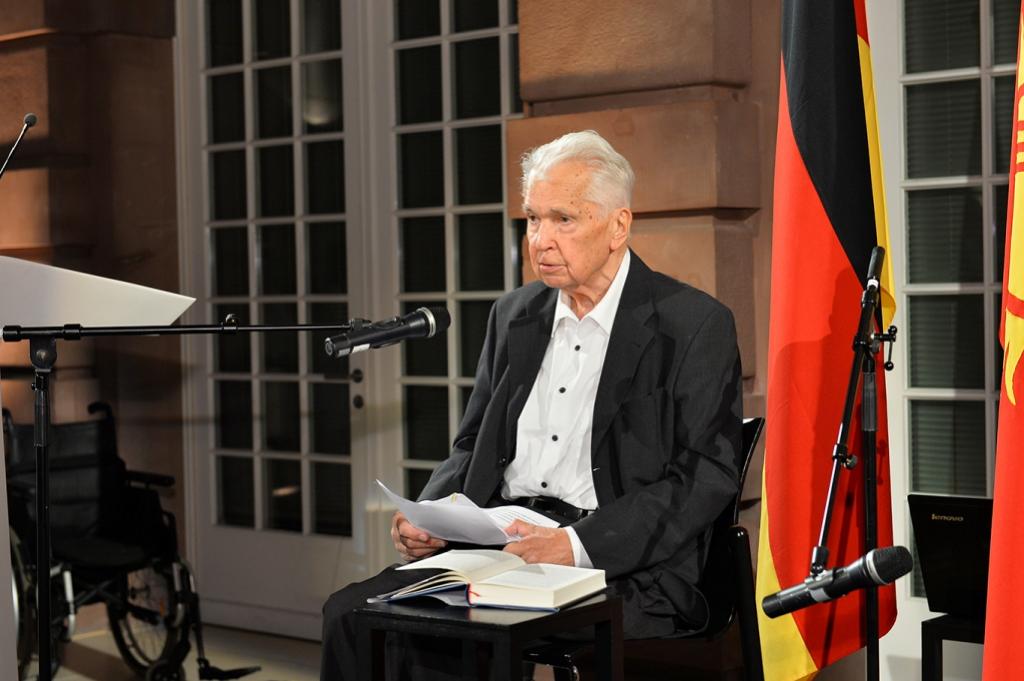The famous German translator, publisher, writer, longtime friend of Kyrgyzstan Leonard Kossuth died in Berlin at the age of 99

On March 1, 2022, the famous German translator, publisher, writer, longtime friend of Kyrgyzstan Leonard Kossuth died in Berlin at the age of 99. The whole creative life of L.Kossuth was connected with Soviet literature. With special warmth, L. Kossuth recalled his work at the publishing house “Volk und Welt” (“People and the World”), where many works of the great Kyrgyz writer Chingiz Aitmatov were also published in the translation of L. Kossuth’s wife, Charlotte Kossuth, who died in 2014 in aged 89 years. The Kossuths translated the works of famous writers from the countries of the former Soviet Union, including Kyrgyzstan, into German. Thanks to their work, the works of famous writers from Russia, Kazakhstan, Kyrgyzstan and other countries became known on German soil.
Charlotte Kossuth translated the works of Ch. Aitmatov, such as “Cranes Fly Early”, “The Day Lasts More Than a Hundred Years”, “The Cry of a Migratory Bird”, “The White Ship”, “The Place oft he Skull”, etc. The Kossuth spouses recalled their interesting meetings with special warmth with Ch. Aitmatov and trips to Kyrgyzstan, about the friendliness and hospitality of the Kyrgyz people. Once, Ch. Aitmatov, during one of such meetings with the Kossuth family in Kyrgyzstan, said: “We are connected by a common cause, that is, a common destiny.”
In one of L. Kossuth's books, the conversation with Ch. Aitmatov was published in a short form. Below is a short excerpt from that conversation:
“Ch.Kossuth: In all your works, one can feel how closely you are connected with the people and nature of your small homeland. It seems to me that your native ail Sheker is somehow present in all your works..... Problems, scales have expanded, become global. Has your attitude towards people, towards your homeland, changed?
Ch. Aitmatov: In any case, a person must have something to which his heart is attached, something dear to him ... A person must suffer when nature around him is destroyed, when rivers are polluted, when trees die in the forests and stop growing grass. I no longer see the colors of my childhood. In the past, in my childhood, in the springtime, the mountains and fields were literally strewn with flowers... For five to ten days we lived in the land of flowers. Now all this no longer exists. Of course, you can remain indifferent to this and say to yourself: “I don’t care, I won’t live that long, soon we will all be gone.” If a person thinks so, it means that he was brought up poorly in childhood or he has changed for the worse. Even wild animals cannot think like that. Even a predator unconsciously feels nature; if it is abundant and whole, he feels good, finds a lot of game, a lot of grass, feels warmth, the sun, the coolness of the earth, the purity of the air. But if none of this is there, if everything is spoiled, it also suffers, feels worse. But it is very bad when a person begins to oppress him, kill, exterminate all living things. Therefore, it is important that a person retains the ability to love his country, to sympathize with its difficulties, so that he is not indifferent, if for some reason the snow on the mountain begins to melt quickly, and then does not resume, so that he is not indifferent and thinks about why this is how it happens and whether this change caused some kind of disturbance..... If a person resigns himself to this, then in the end he denies himself. If he denies nature, if he denies animals and the living world more and more, if he denies the plant world, if he does not worry, does not defend them, does not fight, then, in the end, he denies himself“.
The Embassy of the Kyrgyz Republic maintained close contacts with the Kossuth family and expresses sincere condolences to all relatives and friends, readers and admirers of L. Kossuth's work.



